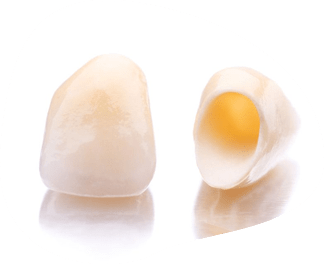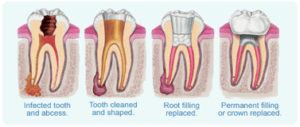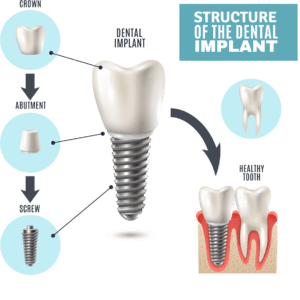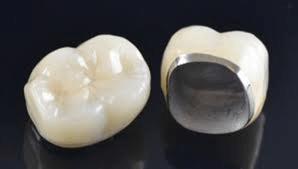The process of getting dental crowns
There are three main stages to consider when having a dental crown fitted. We will break them down for you so we can explain things clearer.
1. Preparation
First, you will need local anaesthetic and impressions of the top and bottom teeth as they currently are. These are used for the temporary crown and also as a record of the bite for the dental lab.
Then the dentist will prepare the tooth to the shape required for the crown chosen. This will involve some drilling of the outer surface of the tooth, to make space for the crown in the bite. The amount of tooth removed is roughly equal to the thickness of the type of crown selected.

Once the tooth is the correct shape, another impression of the tooth is taken which is also sent to the dental lab

Once this has been done, the original impression is used to create a temporary crown. This is made from an acrylic resin material. It is important to remember that this temporary crown will have the same shape of the tooth before the preparation is done. The temporary crown will also not be a perfect colour match.

The temporary crown is cemented with temporary cement and will not resist biting forces like a permanent crown. It is important to avoid hard, cruncy, nutty or sticky foods while the temporary crown is in place. This could cause it to fracture of lift off the tooth underneath. We also advise avoiding any strongly coloured food for 24 hours such as tomatoes and curries as this could discolour the temporary crown. Your dentist will advise you when the permanent crown will be ready, this can be anywhere from 1 to 4 weeks away depending upon the time it takes to construct the crown in the laboratory.
2. Fitting
The fitting is a much simpler process than the preparation. First, local anaesthetic will be delivered if required and then the temporary crown will be lifted off the tooth. Sometimes this will require a little drilling if the temporary crown will not lift easily.
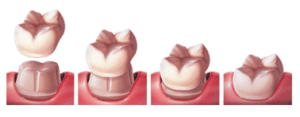
Once the temporary crown is removed, the new crown is checked for fit. Sometimes minor adjustments are required. Once the crown fits well, the tooth is dried and a permanent cement is selected to seat the crown. Following this fitting, the bite is checked and adjusted with carbon articulating paper.
3. Aftercare
After straightening the teeth, you may find that the gumline is level but the edges of the teeth are uneven. This is due to teeth wearing down over time and it is easily corrected with a technique called composite bonding. We can use white, tooth-coloured composite material to bond to the teeth allowing us to reshape and balance your smile in a safe, minimally invasive way. However, this material does not change colour with whitening gel so natural teeth need to be whitened before composite bonding if this is desired. Whitening and composite bonding is included in our prices for Cfast treatment.
Although dental crowns may be one of the strongest restorations for teeth, they still do require consideration. We would recommend avoiding chewing sticky or boiled sweets as these could potentially “grip” the tooth on chewing and then on opening, lift the crown away from the tooth. It is important to note that like your own natural teeth, they can be susceptible to tooth decay and gum disease. Therefore it is important to follow good hygiene practices and keep the whole mouth as clean as possible. It is important to floss around all the teeth to prevent gum disease and tooth decay. We also advise reducing the frequency and amount of sugar in most diets.
How long will the crown last?
This varies depending on a number of factors, for example – the integrity of the tooth underneath the crown, individual gum disease and tooth decay risk factors. If well cared for they may last over 10 years if the tooth was of good strength previously. In some circumstances, for example if a post has been placed or there is minimal tooth structure under the crown then they may require replacement in less than 5 years.
Does getting a crown hurt?
This is a common question with many dental procedures. There are two aspects of the crown preparation and fitting to consider.
Firstly, at the fitting and preparation your mouth will be anaesthetised for the procedure and will be as comfortable as possible. In some circumstances, for example if you have had a root canal treatment, no anaesthetic may be required at all.
Secondly, some patients may find the impressions a little bit of a mouthful but these only take a minute or so each. It is important to just relax and breathe while the impression material sets, at which point it can be removed.
How much do crowns cost?
The cost of dental crowns can vary depending on if they are provided on both a private or NHS basis. The material selected also so we will discuss each of these options in the section below.
Private dental crowns
Private Dental crowns give you a full range of choice between all the materials currently available from gold to the most natural, cosmetically pleasing all ceramic crowns. Prices across practices can vary significantly as there are cheaper and more expensive private dental laboratories that can be used. At the Vallance Dental Centre we use both local labs and national award winning labs depending upon the case requirements.
Prices for private dental crowns start from £450, this doesn’t include any work required to the tooth beforehand, for example root canal treatment. To see our full list of dental charges click here. If you have dental insurance through work or a private scheme you may be able to claim some or all of the cost back.
NHS dental crowns
A dental crown through the NHS is a band 3 course of treatment. You will be limited to either a silver crown or porcelain fused to metal crown depending on the clinical circumstances. To see the current NHS banding prices click here.
